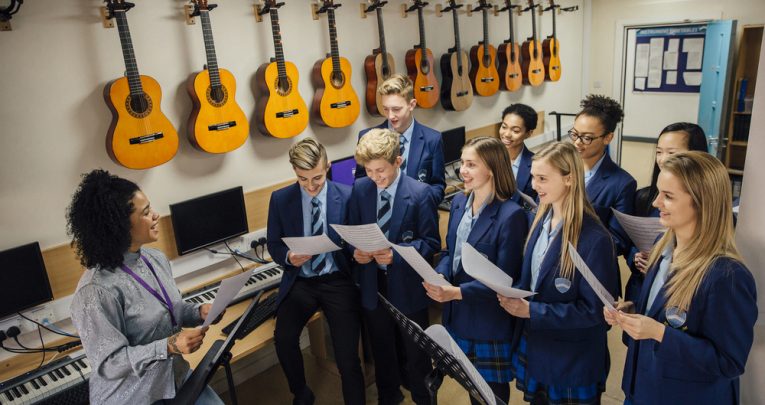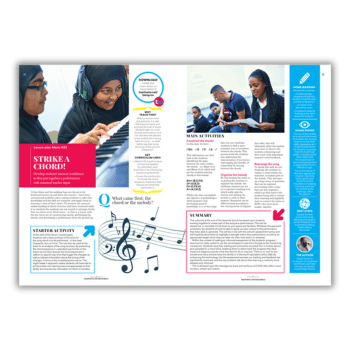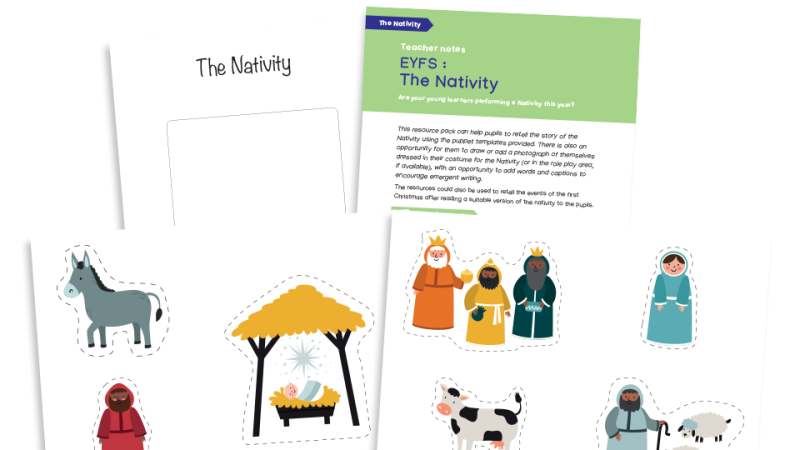Nurturing A Strong Relationship With Music Through Singing In KS3 Can Help Students Succeed In KS4 And Beyond

Let’s start at the very beginning, says Michelle James

For a long time music has been known to have a phenomenally powerful effect on us. There’s a reason why songs and tunes play an integral role in almost every culture, and reams of research show how taking part in musical activities benefits us in relation to our mood, health and forming of connections with one another. So why aren’t we all doing it?
As a musician and educator, I sometimes feel that non-musicians believe we overstate the benefits of our passion, and I think there are two parts to this. First, the range of advantages is so seemingly wide it can appear too good to be true and secondly, there have been several spurious research claims that have subsequently been debunked (the so-called Mozart effect being the most famous). This has made it difficult to see the wood for the trees and know which evidence can be trusted.
Multiple benefits
Nevertheless, the health benefits associated with singing in particular have led to many health professionals prescribing participation in regular singing activities. This has been found to improve respiratory function in some patients, help stroke victims with speech problems, re-animate memory in dementia patients and lift symptoms of depression and anxiety; often some of the most compelling testimony from participants is simply, “I feel so much better when I sing”.
Above all, it is perhaps the feeling of connectedness that singing with others provides that is its most powerful attribute. We surely want our students and children to gain from all these benefits? But how best to support it happening is the challenge, particularly when there are so many other pressures on everyone’s time, and not all young people might gravitate towards taking part in music without some serious encouragement!
Engaging every child in regular, high quality music-making can seem like a tall order when faced with a class of Year 7s who arrive at school with varied musical backgrounds. However, it’s possible to find starting points that level the playing field and engage the whole group – singing is a particularly good way of doing this and can be used as a way of including everyone, forming a direct pathway to more specific musical learning outcomes.
Measurable impact
The current pressure on schools to focus on STEM subjects brings a resulting risk of arts subjects being downgraded in importance in education generally. But, if music is neglected over the coming few years it will be to everyone’s detriment.
You can showcase the benefits from taking part in music by forming choirs and singing groups across the school. It is possible to find relatively simple repertoire which can be sung impressively fairly quickly – this helps to engage your students who are new to singing through early rewards and demonstrates quickly to the rest of the school what can be achieved.
Singing students will become your best advocates for music – some teachers do end of term surveys with learners to capture how they feel about taking part. This builds an impressive set of data about how they are benefiting as individuals.
You’ll be surprised how many will, unprompted, tell you that singing makes them feel better, relieves stress, helps them to build friendship groups and gives them something positive to work towards collectively.
If you develop these practices through Years 7, 8 and 9, it is more likely that when it comes to the stresses and strains of exams at GCSE and beyond your students will have formed healthy habits to help them take productive, revitalising musical breaks away from their studies and return refreshed.
And given what has been in the press recently about KS3 being the ‘lost years’ of education – making music an underpinning foundation of neurological and psychological development through those adolescent years would be a hugely positive step to take. It’s a great opportunity to give those still-forming young minds a boost.
Michelle James is CEO of Sing Up, an organisation that provides songs, teaching resources and training for schools and teachers.












